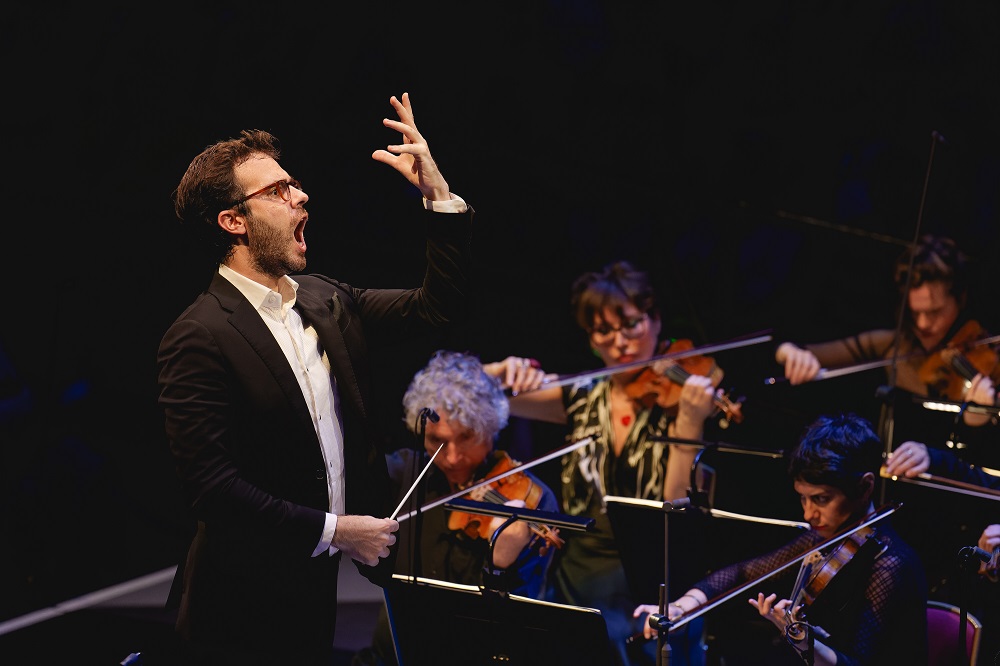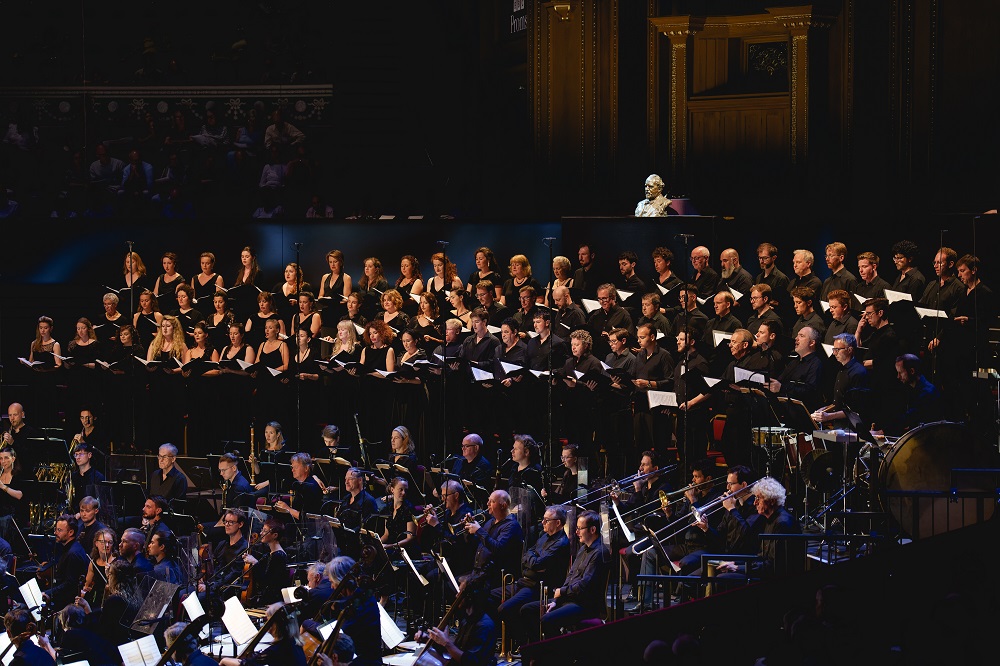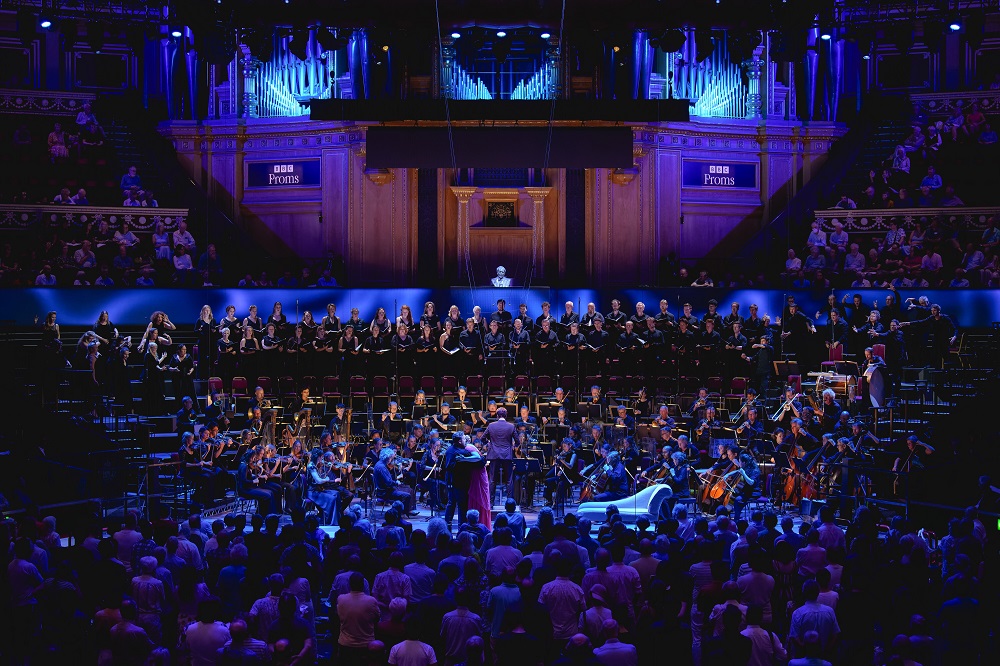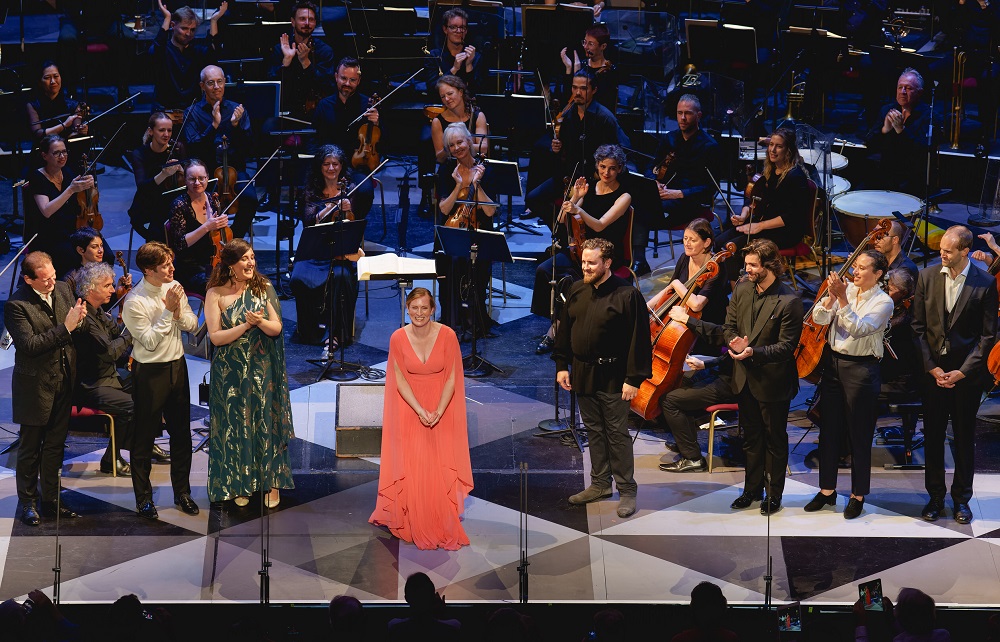Prom 64: Les Troyens, Orchestre Révolutionnaire et Romantique, Sousa review - ravishing interpretation of Berlioz's masterpiece | reviews, news & interviews
Prom 64: Les Troyens, Orchestre Révolutionnaire et Romantique, Sousa review - ravishing interpretation of Berlioz's masterpiece
Prom 64: Les Troyens, Orchestre Révolutionnaire et Romantique, Sousa review - ravishing interpretation of Berlioz's masterpiece
A stunning reminder of how relevant the opera’s themes remain today

It’s one of the great tragedies of Les Troyens that its composer never got to hear it performed in its entirety during his lifetime. This ravishing, big-hearted interpretation of the two of the most dramatic episodes in Virgil’s Aeneid was dismissed by orchestras that could not comprehend its technical or emotional demands, with the consequence that there was no attempt at a proper staging till 21 years after Berlioz's death.
Last night’s astonishing performance of Berlioz's masterpiece by the Orchestre Révolutionnaire et Romantique and the Monteverdi Choir conducted by Dinis Sousa (pictured below) in a semi-staged version – was simultaneously a vindication of the composer’s vision and a stunning reminder of how relevant the opera’s themes remain today. In our war-torn world, where the political fates of countries are increasingly determined by patterns of migration, this story of violence, ambition, and the struggle for dignity in exile blazes as vividly as it ever did in the ancient imagination.  Berlioz, like both Homer and Virgil, fixed on key episodes to refract the entirety of the 10-year Trojan war, and the evening opened with an eruption of joy as the Trojans celebrated the apparent retreat of the Greeks. The composer’s evocative French libretto – which, in the one slightly misjudged element of the evening had strikingly different translations in the booklet given to audience members and the surtitles – made us all eye-witnesses as they surrounded Achilles’ empty tent or seized on abandoned pieces of armour.
Berlioz, like both Homer and Virgil, fixed on key episodes to refract the entirety of the 10-year Trojan war, and the evening opened with an eruption of joy as the Trojans celebrated the apparent retreat of the Greeks. The composer’s evocative French libretto – which, in the one slightly misjudged element of the evening had strikingly different translations in the booklet given to audience members and the surtitles – made us all eye-witnesses as they surrounded Achilles’ empty tent or seized on abandoned pieces of armour.
One of the interesting back-stories of The Trojans is that Berlioz wrote it at the instigation of a powerful woman – Princess Wittgenstein, also a supporter of Liszt, who declared to Berlioz that if he shrank from “the hardships that [writing the opera] is bound to cause you…I do not want to see you ever again”. While it would be anachronistic to call the composer a feminist, he certainly demonstrates an empathy and understanding for the pressures that powerful women faced, taking the female characters in the Aeneid and making their stories even more compelling and full-blooded than they are in the original.  Mezzo-soprano Alice Coote – who at last year’s Proms gave a magnetic interpretation of the role of Dido in Purcell’s Dido and Aeneas – here took on the role of Cassandra, the prophet who in Greek mythology was famously cursed by Apollo to make predictions that no-one believed. Where both in Greek tragedy and the Aeneid itself the emphasis was often on her victimhood, Berlioz made her not just a powerful voice of warning, but an inspiration to the Trojan women to rise up and resist the Greeks’ attempts to rape and pillage their way to bloody victory.
Mezzo-soprano Alice Coote – who at last year’s Proms gave a magnetic interpretation of the role of Dido in Purcell’s Dido and Aeneas – here took on the role of Cassandra, the prophet who in Greek mythology was famously cursed by Apollo to make predictions that no-one believed. Where both in Greek tragedy and the Aeneid itself the emphasis was often on her victimhood, Berlioz made her not just a powerful voice of warning, but an inspiration to the Trojan women to rise up and resist the Greeks’ attempts to rape and pillage their way to bloody victory.
Coote instantly asserted her authority with velvety nuanced tones, fully mining the sense of foreboding and premonition in the text as she described the ghost of the Trojan hero Hector “parcourir nos remparts/Comme un veilleur de nuit” (“pacing our ramparts/Like a night watchman”). In contrast to the ebullient triplets of the overture that mark the Trojans’ joy, as Cassandra starts singing Berlioz uses the triplet motif in opposition to the sustained, sombre melody of her opening lines, setting up a rhythmic tension that echoes her profound disquiet.
In contrast to Coote’s growing agitation, Lionel Lhote as her doomed fiancé Coroebus brought a sense of reassurance and rhapsodic calm as he tried to reason that her forebodings meant nothing. In his lyrics – which celebrate the beauty of the Trojan landscape – it’s possible to see how Berlioz was inspired not just by Virgil’s Aeneid but by his Georgics which were similarly a paean to the simple pleasures of rural existence. Lhote managed to evoke that sense of Virgil’s idealised world not just through the lyrics but through the mellifluous richness of his voice. The contrast between Coroebus’s delusions and Cassandra’s vision is just one of the many dramatic conflicts that gives this work its profound dynamism and here you felt its full resonance.  While it is the female characters who shine here, the Aeneid is of course about Aeneas, and though Berlioz is clearly less interested in him than in either Cassandra or Dido, he still allows him to be more three-dimensional than in the Latin text. For a start he allows Aeneas to introduce himself by narrating one of the most powerful moments in Aeneid II, in which the priest Laocoon warns of the dangers of bringing the wooden horse into Troy and is devoured by monstrous sea serpents.
While it is the female characters who shine here, the Aeneid is of course about Aeneas, and though Berlioz is clearly less interested in him than in either Cassandra or Dido, he still allows him to be more three-dimensional than in the Latin text. For a start he allows Aeneas to introduce himself by narrating one of the most powerful moments in Aeneid II, in which the priest Laocoon warns of the dangers of bringing the wooden horse into Troy and is devoured by monstrous sea serpents.
Tenor Michael Spyres (pictured above in the love scene with Paula Murrihy and below to her left, with mezzo Beth Taylor to her right) instantly brought a sense of authority and emotional intelligence to the role of Aeneas, simultaneously heroic and humble. Through him we watched the tension build as the Trojans had the chance to save themselves by rejecting the Greeks’ gift of the horse but decided to ignore the portents. The consistently brilliant Orchestre Révolutionnaire et Romantique brought out the jagged rhythms of Berlioz’s orchestration as for a moment the Trojans thought they could hear the clanking of arms. In Act II once more it felt as if we were eye witnesses as the city collapsed, before Cassandra and the women of Troy made the heroic gesture of committing mass suicide.  From Act III onwards we were in Carthage, watching as the great love story between Paula Murrihy’s commanding, eloquent Dido (pictured above being applauded) and Spyres’ Aeneas played out. Here Spyres' emotional intelligence really elevated the drama, though he was considerably helped by the fact that Berlioz allows Aeneas to express his frustration and rage at being torn away from Dido by the gods. The duet in which they celebrate their “night of rapture” was particularly ravishing as they melded their voices into each other, giving the sinuous melodies full resonance. Like Coote’s Cassandra, Murrihy’s Dido was no victim, but an intelligent complex woman fighting to play her part in a rapidly disintegrating world.
From Act III onwards we were in Carthage, watching as the great love story between Paula Murrihy’s commanding, eloquent Dido (pictured above being applauded) and Spyres’ Aeneas played out. Here Spyres' emotional intelligence really elevated the drama, though he was considerably helped by the fact that Berlioz allows Aeneas to express his frustration and rage at being torn away from Dido by the gods. The duet in which they celebrate their “night of rapture” was particularly ravishing as they melded their voices into each other, giving the sinuous melodies full resonance. Like Coote’s Cassandra, Murrihy’s Dido was no victim, but an intelligent complex woman fighting to play her part in a rapidly disintegrating world.
This production arrived at the Proms under its own particular storm cloud, yet though this meant that John Eliot Gardiner wasn’t conducting, there was no sense here that we were watching any kind of substitute. Sousa presided over the entire evening with confidence and elan. Both in the major roles and the minor roles it felt as if there wasn’t one weak link – other standouts included mezzo-soprano Beth Taylor as Dido’s fun gossipy sister Anna, and tenor Laurence Gilsby who managed to make the entire hall go quiet as he sang to the Carthaginian court. This is an opera full of ghosts and it was tempting to imagine how overjoyed Berlioz's own ghost might have been if he'd seen this version – at the end of the five and a half hour performance, both I and my companion for the evening agreed we would have happily watched it all over again.
rating
Explore topics
Share this article
The future of Arts Journalism
You can stop theartsdesk.com closing!
We urgently need financing to survive. Our fundraising drive has thus far raised £49,000 but we need to reach £100,000 or we will be forced to close. Please contribute here: https://gofund.me/c3f6033d
And if you can forward this information to anyone who might assist, we’d be grateful.

Subscribe to theartsdesk.com
Thank you for continuing to read our work on theartsdesk.com. For unlimited access to every article in its entirety, including our archive of more than 15,000 pieces, we're asking for £5 per month or £40 per year. We feel it's a very good deal, and hope you do too.
To take a subscription now simply click here.
And if you're looking for that extra gift for a friend or family member, why not treat them to a theartsdesk.com gift subscription?
more Opera
 Albert Herring, English National Opera review - a great comedy with depths fully realised
Britten’s delight was never made for the Coliseum, but it works on its first outing there
Albert Herring, English National Opera review - a great comedy with depths fully realised
Britten’s delight was never made for the Coliseum, but it works on its first outing there
 Carmen, English National Opera review - not quite dangerous
Hopes for Niamh O’Sullivan only partly fulfilled, though much good singing throughout
Carmen, English National Opera review - not quite dangerous
Hopes for Niamh O’Sullivan only partly fulfilled, though much good singing throughout
 Giustino, Linbury Theatre review - a stylish account of a slight opera
Gods, mortals and monsters do battle in Handel's charming drama
Giustino, Linbury Theatre review - a stylish account of a slight opera
Gods, mortals and monsters do battle in Handel's charming drama
 Susanna, Opera North review - hybrid staging of a Handel oratorio
Dance and signing complement outstanding singing in a story of virtue rewarded
Susanna, Opera North review - hybrid staging of a Handel oratorio
Dance and signing complement outstanding singing in a story of virtue rewarded
 Ariodante, Opéra Garnier, Paris review - a blast of Baroque beauty
A near-perfect night at the opera
Ariodante, Opéra Garnier, Paris review - a blast of Baroque beauty
A near-perfect night at the opera
 Cinderella/La Cenerentola, English National Opera review - the truth behind the tinsel
Appealing performances cut through hyperactive stagecraft
Cinderella/La Cenerentola, English National Opera review - the truth behind the tinsel
Appealing performances cut through hyperactive stagecraft
 Tosca, Royal Opera review - Ailyn Pérez steps in as the most vivid of divas
Jakub Hrůša’s multicoloured Puccini last night found a soprano to match
Tosca, Royal Opera review - Ailyn Pérez steps in as the most vivid of divas
Jakub Hrůša’s multicoloured Puccini last night found a soprano to match
 Tosca, Welsh National Opera review - a great company reduced to brilliance
The old warhorse made special by the basics
Tosca, Welsh National Opera review - a great company reduced to brilliance
The old warhorse made special by the basics
 BBC Proms: The Marriage of Figaro, Glyndebourne Festival review - merriment and menace
Strong Proms transfer for a robust and affecting show
BBC Proms: The Marriage of Figaro, Glyndebourne Festival review - merriment and menace
Strong Proms transfer for a robust and affecting show
 BBC Proms: Suor Angelica, LSO, Pappano review - earthly passion, heavenly grief
A Sister to remember blesses Puccini's convent tragedy
BBC Proms: Suor Angelica, LSO, Pappano review - earthly passion, heavenly grief
A Sister to remember blesses Puccini's convent tragedy
 Orpheus and Eurydice, Opera Queensland/SCO, Edinburgh International Festival 2025 review - dazzling, but distracting
Eye-popping acrobatics don’t always assist in Gluck’s quest for operatic truth
Orpheus and Eurydice, Opera Queensland/SCO, Edinburgh International Festival 2025 review - dazzling, but distracting
Eye-popping acrobatics don’t always assist in Gluck’s quest for operatic truth
 MARS, Irish National Opera review - silly space oddity with fun stretches
Cast, orchestra and production give Jennifer Walshe’s bold collage their all
MARS, Irish National Opera review - silly space oddity with fun stretches
Cast, orchestra and production give Jennifer Walshe’s bold collage their all

Add comment